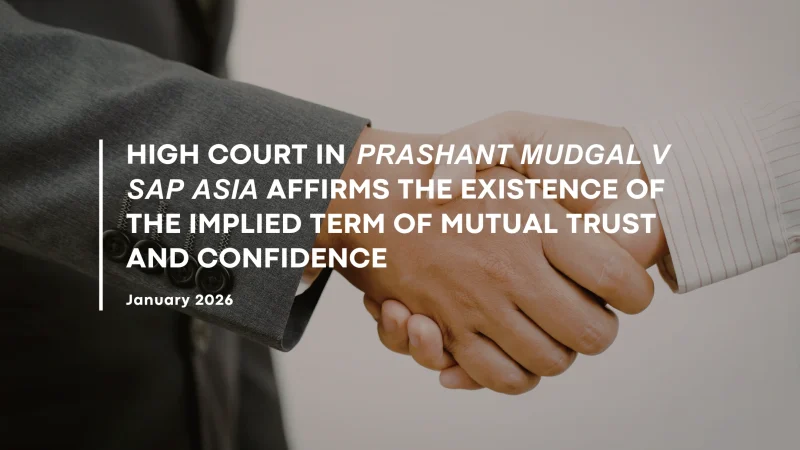Wong Leng Si Rachel v. Wu Su Han Olivia
Wong Leng Si Rachel v Wu Su Han Olivia [2022] SGHC 151 – Does the Court have the power to make an order for discovery of documents, notwithstanding that a party had already sworn on oath that he or she does not have the requested documents in his or her possession, custody or power?
OVERVIEW
In the recent case of Wong Leng Si Rachel v Wu Su Han Olivia [2022] SGHC 151 (“Judgment”), the respondent successfully resisted the appellant’s appeal against the Principal District Judge’s order for specific discovery (the “Appeal”).
PDLegal LLC’s Partner, Gerard Quek, and Associate Glenn Chua acted for the successful respondent in the Appeal from the District Court to the General Division of the High Court.
THE BACKGROUND
The appellant is a social media influencer. The respondent works in the healthcare industry. Sometime in 2020, the respondent published various statements on her Instagram page. The appellant claims, amongst other things, that those statements are defamatory as they, inter alia, impute that the appellant committed infidelity on her wedding day with the wedding emcee, Alan Wan, and had no intention of marrying the appellant’s ex-husband. The respondent denies the appellant’s claim and relies on the defences of justification and/or fair comment.
The respondent then sought specific discovery of, inter alia, the appellant’s correspondences with two individuals and diary entries. The Deputy Registrar allowed the respondent’s application at first instance. On appeal, the Principal District Judge upheld the Deputy Registrar’s orders. The appellant then filed her appeal against the Principal District Judge’s decision to the General Division of the High Court.
Two issues that arose in this Appeal are:
- whether specific discovery should be ordered notwithstanding that a party had already sworn on oath that he/she does not have the kind of documents sought in his/her possession, custody or power. The High Court found that the Court has powers to order for specific discovery in such circumstances if it can be shown that there is reasonable belief that the document(s) sought exist.
- whether the respondent’s application was a “fishing expedition”. The High Court found that it was not a “fishing expedition” because “samples of relevant material had been produced” by the respondent and that “it is not mere fishing expedition if fish has in fact been spotted” (at [13] of the Judgment).
THE HIGH COURT’S DECISION
On appeal, Justice Choo upheld the Principal District Judge’s decision. As such, the appellant will be required to disclose (i) all her correspondences with two individuals, and (iii) all her diary entries relating to Alan Wan.
Reasonable Belief that Further Documents Exist
While the appellant argued that she had already sworn on oath that she does not have the documents sought in her power, custody, or control, Justice Choo held that the argument is “not an adequate one” (at [10] of the Judgment). In particular, Justice Choo found that there is reason to believe that other similar documents may be found, having regard to the documents exhibited by the respondent in her affidavit. Further, Justice Choo upheld the lower Court’s decision and found that the documents sought by the respondent were indeed relevant and material for the trial.
Fishing Expedition?
Justice Choo also disagreed with the appellant’s argument that the respondent’s application was a “fishing expedition”, because “sample of relevant material had been produced” by the respondent (at [13] of the Judgment). In this regard, Justice Choo explained that “fishing expedition” is not permitted because the court “should not order disclosure that lends indiscriminate assistance to such unmeritorious application” (at [13] of the Judgment).
KEY TAKEAWAYS
The High Court’s decision reiterates the position (first set out in the case of Soh Lup Chee v Seow Boon Cheong and another [2002] 1 SLR(R) 604) that the Court has the power to make an order for discovery notwithstanding that a party had already sworn on oath that he/she does not have the requested documents in his/her possession, custody or power .
*The writers are grateful for the contribution of Lee Ryan SMU Law Class of 2024

